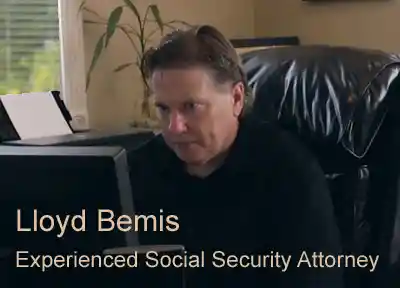Can creditors take your Social Security Disability benefits to pay off debt?
If I am on Social Security Disability can creditors take my benefits?
Author Attorney Lloyd Bemis:
When a person becomes disabled, they often struggle financially. Keeping up with monthly expenses on a low income is difficult and they may fall into debt or they may have incurred debt before they became disabled. Creditors begin to call and threaten legal action. What should a person with disabilities know about debt and how to protect their benefits?

Under federal law, some government benefits are protected and cannot be garnished or “frozen.” Does this include SSI, VA and SSDI benefits? A lawyer explains.
When a creditor is unable to collect a debt, the creditor can obtain an order from a court allowing the creditor to take a portion of the debtor’s money out of a bank or credit union account.
This is called “garnishment.” If your account is garnished or “frozen” you will not have access to those funds and any checks written on the account will not clear. However, under federal law, some government benefits are protected and cannot be garnished or “frozen.”
These benefits include:
- Supplemental Security Income
- Social Security Disability Income
- Veterans Administration benefits
- Military annuities and survivor benefits
- Federal Employee Retirement
- Civil Service Retirement
- Federal railroad retirement, unemployment and sickness benefits
- Foreign Service Retirement
- Federal Student aid
There are some exceptions to these rules.
Federal funds may be used to pay delinquent federal taxes or pay federal student loans and Social Security Disability Income may be garnished to pay for child support. Supplemental Security Income cannot be taken to pay for either child support or alimony.
Funds that are directly deposited from a federal agency into an individual’s account are automatically protected from garnishment.
Funds that are not deposited directly or funds that are later transferred into a different account are not protected. For example, if your SSDI benefits are directly deposited into your personal bank account, those funds cannot be garnished. But, if you transfer a portion of those funds into a separate bank account, such as a business account, the funds in the business account can be garnished.
If you have been denied disability don’t give up! Contact a Disability lawyer at 512-454-4000 for a free consultation and get the benefits you deserve.
Despite federal protections, sometimes money is illegally garnished from bank accounts.
Under a law enacted in 2011, when a bank receives a garnishment order they must identify the source of a direct deposit to determine if the funds are a federally protected benefit. A bank is not permitted to freeze any funds directly deposited within the last two months. This is known as the “look back” period. If you receive $1,000 each month in SSDI and your bank account has a balance of $2,000, the bank cannot freeze those funds and must allow you access to $2000. If your bank balance is $3,000, however, the bank is permitted to freeze the remaining $1,000. In addition, if your bank account has a balance that is lower than two months of direct deposits, for example, $1,500, the bank cannot freeze the account. It is important to note that banks are not required to trace direct deposit funds to other accounts, so if you have $1,500 in an account where SSDI was originally deposited and $300 in a separate account, the $1,500 is protected, but the $300 is not.
A bank must review all your accounts.
When the bank completes its review of your accounts, it has three days to send you a notice of garnishment and the results of its review. Unfortunately, a garnishment notice will not delay a freeze of any unprotected funds.
The notice must state:
- The date the garnishment order was received
- The name of the creditor involved
- An explanation of garnishment
- The account under the garnishment order
- The bank’s responsibility to protect federal benefits directly deposited during the look back period and make those funds accessible to the account holder
- The protected deposits identified
- The requirement that the bank freeze any funds in the account that are unprotected
- The amount of bank fees
- How to assert exemptions on funds bank is ordered to freeze
- Your right to obtain legal advice
If funds in your bank account are frozen, inform the bank that funds in the account are exempt and ask the bank to lift the freeze and waive any bank fees.
Be sure to contact anyone you have written checks to and explain you are working with your bank to resolve the situation. If the bank refuses to lift the freeze, you will need to submit documentation to the court and allow a judge to decide if the funds are exempt. If you can provide enough strong evidence, including deposit dates, amounts, and sources of electronic funds, a judge will not allow the funds to be garnished. In these circumstances, it’s best to retain an attorney who can act as your representative to creditors and guide you through a difficult financial period.
Disability benefits are an important source of income for those who are unable to work. If you not able to work due to accident or illness, you may be eligible for Social Security Disability or Long Term Disability benefits. If you have applied for benefits and been denied, contact the attorneys at Bemis, Roach and Reed for a free consultation. Call 512-454-4000 and get help NOW.
What is the difference between VA Disability and Social Security Disability Benefits?
Disability offsets – Can I receive two sources of disability income at once?
Where can you find help Paying Bills in Austin Texas?


![]()
Your Free Initial Consultation
Call now:
At Bemis, Roach and Reed, if we can't help you, we will try to find the right attorneys for you.
We offer each of our prospective clients a free no obligation one hour phone or office consultation to see if we can help you and if you are comfortable with us. We know how difficult a time like this can be and how hard the decisions are. If we can be of assistance to you and help you find a solution to your issue we will even if that means referring you to another attorney.
Let's get you Started:
If you could provide us with some basic information about your claim we will get right back with you with a free case evaluation and schedule your Free Consultation Today.






